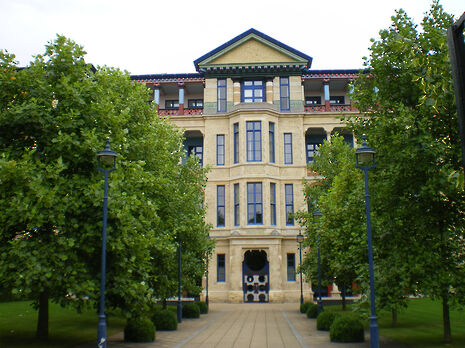Dramatic fall in overseas MBA students applying to Cambridge
MBA applications declined by 23 per cent for the 2012-13 class

The number of overseas students applying to study MBAs at Cambridge University’s Judge Business School fell by almost a quarter in 2012, according to recent figures.
The decline in overseas applications for the MBA at Cambridge is consistent with trends across the country - the number of overall enrolments is at its lowest for the past eight years according to data from the Financial Times Global MBA rankings. Conrad Chua, head of MBA admissions and marketing at the Judge Business School, said that the increasing global competition for MBA places represented a “flight to quality” on the part of the best applicants.
The drop in student numbers is attributed by some British business schools to tighter UK Border Agency work visa restrictions and to the poor economic situation. Speaking to the Financial Times, Paul Marshall, chief executive of the Association of Business Schools, warned that the decline in MBA student numbers “would not help the economy recover.”
The figures reveal an increasingly pronounced hierarchy in the desirability of British MBA courses. Only three schools - London, City’s Cass and Warwick - have seen an overall rise in applications since 2010, while Bradford University School of Management saw the largest decline in MBA students, from 103 in 2010 to just 20 in 2012. The Judge School in Cambridge was spared the worst of the fall, with Conrad Chua pointing out on Twitter that figures for applications had stayed “reasonably constant over this time”.
Speaking to Varsity, Chua said: “There was a 23% decline in applications for places in the class of 2012-13. The tough rhetoric about student visas could have created the perception that the UK is closed to non-EU students.” Pointing to the wider economic circumstances, Chua wrote that “the uncertain economic climate could also be partly to blame for the decline in applications”, but also pointed out that Cambridge MBA enrolments had only seen a modest decline.
Overseas applicants represent a large majority of Cambridge’s MBA population, with 95 per cent of all MBA students in the 2012 class coming from outside the United Kingdom. The professional applicants for the Cambridge course come mainly from industry, finance and consulting and 8 per cent of students have family with them in Cambridge.
The decline in student numbers may have a financial effect on the Judge, as cuts to higher education mean that income from tuition fees is becoming ever more important. The tuition fee in 2013/14 for the Cambridge MBA will be £38,000 a year, with an average £2,358 in addition for membership of a Cambridge college.
Named for its founding benefactor Sir Paul Judge, Cambridge’s business school was founded in 1990 and offers doctoral, masters and undergraduate programmes in management and business.
The Judge, which took eighth place in the FT European business school rankings of 2012, boasts that 97 per cent of its MBA graduates are employed 3 months after completing the MBA course. 40 nationalities are represented in the 152-strong class of 2012 and have an average age of 29.6.
 News / Meta opens £12 million lab in Cambridge 11 July 2025
News / Meta opens £12 million lab in Cambridge 11 July 2025 Lifestyle / Reflections on rowing10 July 2025
Lifestyle / Reflections on rowing10 July 2025 News / Write for Varsity this Michaelmas13 July 2025
News / Write for Varsity this Michaelmas13 July 2025 Features / How to catch a coat thief13 July 2025
Features / How to catch a coat thief13 July 2025 Comment / What is originality, anyway? 14 July 2025
Comment / What is originality, anyway? 14 July 2025








